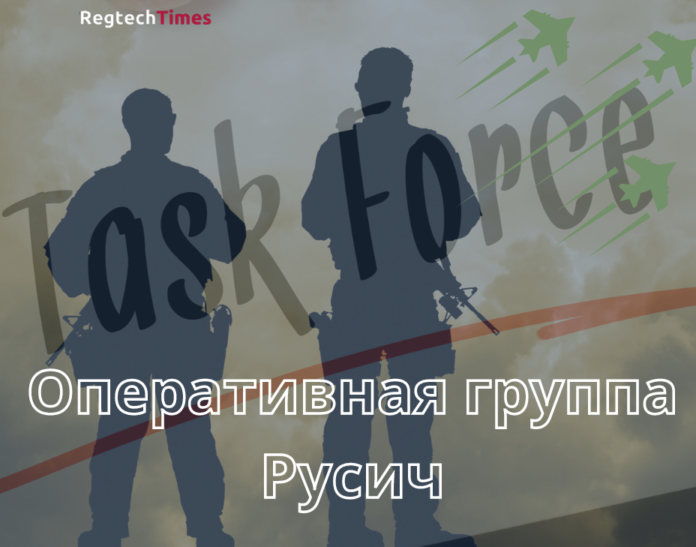The United States Office of Foreign Assets Control (OFAC) recently placed sanctions on the Task Force Rusich, a Russian para-military group, as part of its Specially Designated Nationals (SDN) list. The SDN list in question is heavily connected to the US’s ongoing sanctions against Russia for its brutal invasion of Ukraine.
What is Task Force Rusich?
Task Force Rusich was established by Alexey Yurevich Milchakov and Yan Igorevich Petrovskiy- two graduates of the Russia Imperial Movement (RIM)’s paramilitary training unit, Partizan- in the summer of 2014. It has since been connected to Russian combat actions in the Middle East, Africa, and Ukraine.
Task Force Rusich gained a reputation for its ferocity and ties to neo-Nazi philosophy long before its involvement in the February 2022 Russian invasion of Ukraine. Their violent reputation was further fueled by rumors that one of its founders, Milchakov, tore a puppy’s head off with his teeth; and spread images of dead Ukrainian troops during the group’s 2014 military operations in Ukraine.
Along with being condemned and punished by the United States, Canada, European Union, Switzerland, and Australia, the group has also been under investigation by the Hague for its involvement in various war crimes.
It is suspected that at least three Russian neo-Nazi and white supremacist mercenary organizations, including the “Russian Imperial Movement” (RIM) and “Wagner Group,” are currently active in Ukraine. Task Force Rusich has been known to be active in Ukraine since at least April 2022. As of July 2022, there were active Rusich members in the Ukrainian city of Izyum. After the city was freed by the Ukrainian troops in September, more than 440 human remains, many of which bore evidence of torture, were discovered at a mass grave site, providing further evidence of the group’s violent methodologies.
According to reports, Task Force Rusich has ties to the Wagner Group, a neo-Nazi-affiliated, private Russian military mercenary organization that has existed at least since 2014, when it supported the Russian military in annexing Crimea. Additionally, Task Force Rusich is connected to the “Union of Donbas Volunteers,” a group founded by Alexander Borodai, a former Russian-appointed separatist leader in the Donetsk region, who is currently a lawmaker in President Vladimir Putin’s party (This information is according to a report by the New America think tank).
Why is Task Force Rusich in the news?
At the outset of the Russian invasion of Ukraine in February 2022, a Task Force Rusich Telegram account began circulating a number of cryptocurrency addresses to solicit money for various combat-related supplies. The requests specifically mention drones, body armor, vehicles, and weapon sights, all items that would potentially go on to be used in the invasion. The OFAC was recently able to link a few of these wallets to the Taskforce and expose the addresses to the public in an attempt to dissuade them from collecting further funds to finance their militaristic activities.
How do groups like Task Force Rusich fund their operations?
Online fundraising is a common activity among Russian mercenary organizations and their supporters, who use various platforms to raise money for weapons, medical supplies, and care for their wounded soldiers. These organizations usually raise funds using crowdfunding websites and virtual wallets to amass funds. However, it was found that most of their fundraising operations are funded by Russian bank cards.
Organizations with these motives were also found raising funds by marketing goods with their own and the paramilitary organizations’ emblems, which also helped their supporters spread their propaganda. To aid Russia’s territorial goals in its conflict with Ukraine, the mercenary group Task Force Rusich, for instance, persuades its fans to contribute to their cause by transferring cryptocurrency to their virtual wallets.
These groups use various means to diversify their collection methods in case they are caught. Though the OFAC recently caught and released five of the group’s crypto wallet addresses, it is yet to identify its other fund-raising-related credentials. The crypto addresses in question consist of two Bitcoin addresses, two ether addresses, and one tether address.
Cryptocurrency activities associated with Task Force Rusich
According to the blockchain intelligence company TRM, about $138,000 has been sent to 11 Task Force Rusich-owned addresses since March 2022, including the five that were sanctioned by the OFAC on 15 September and six more that are linked to the organization. The most recent activity recorded through these addresses added up to about $400, and they were made just two days before the sanctions were placed, on September 13, 2022.
As of the morning of September 16, 2022, the addresses reflected a balance of around $9,000 in virtual currency- which would no doubt be used to fund further acts in a similar vein to the atrocities in Ukraine. Around the same time, one of the wallets associated with the organization was also disclosed to have received almost $20,000 in donations.
Conclusion
The United States OFAC recently added Task Force Rusich, a Russian neo-Nazi mercenary group, to its Specially Designated Nationals (SDN) after gaining more insight into the group’s online fundraising activities. The US enforcement agency was able to track down five cryptocurrency addresses found to be receiving donations for the group’s military activities, which were promptly released to the public and sanctioned. The OFAC took the measures in order to aid in shutting down the crowd-funding activities of the Russian group, which in turn will help aid Ukraine in its fight against Russia.


